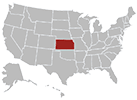
In Kansas, the home health aide training requirement is becoming more time and effort-intensive than the standard federal minimum for those who choose the career.
There are 110 training hours with the HHA programs, 45 of which will be clinical.
Interested candidates should research the necessary training guidelines before spending time, effort, and money pursuing an HHA program in Kansas.
Page Navigation
- What Is A Home Health Aide
- What Are The Requirements For A Home Health Aide
- 5 Home Health Aide Training Programs In Kansas
- What Is The Salary Potential For A Home Health Aide In Kansas
- Frequently Asked Questions
- How can you progress in the field following certification?
- Is the field secure for the future?
- How will a home health aide recognize an eligible client, and how will the services be reimbursed?
- What would construe as primary challenges when considering a career as a home health aide?
- Are there any free training options for students with hardships?
What Is A Home Health Aide
Individuals interested in the caregiving field who want to avoid a career in a nursing or care facility have the option of becoming a home health aide or HHA.
A home health aide will assist seniors and anyone with impairments rendering cognitively or otherwise disabled or chronically ill so that they can continue to live independently.
Depending on the circumstances and the client’s particular needs, care can involve:
- Personal care needs,
- Medication reminders,
- Light housekeeping,
- Errands and driving to appointments,
- Monitoring condition/vitals,
- Meal prep,
- Companionship
The work comes with exceptional rewards in providing socialization for someone who might otherwise be compelled toward isolation and loneliness.
What Are The Requirements For A Home Health Aide
According to the federal government, there is a minimum requirement for individuals who desire to pursue a career as a home health aide.
The law stipulates a condition of no less than 75 training hours, 16 of which need to involve practical training with supervision.
The guideline for working for agencies receiving reimbursement from Medicare can be more than what’s federally required.
Some private facilities don’t take Medicare, and there are states with agencies that allow HHAs to perform services without licensure or certification.
Still, these facilities will have specific guidelines of their own.
Some favored arenas to look for adequate HHA programs that satisfy state certification guidelines are “local nursing facilities, home health facilities, nonprofit organizations, vocational schools, community colleges, and universities.”
In many of these programs, formal education is not a necessity, but some will have a high school education or equivalent as a prerequisite to enroll. Let’s look at a few of these options more closely.
5 Home Health Aide Training Programs In Kansas
Becoming a home health aide is a rewarding career path in Kansas with the potential for incredible growth.
The primary step in gaining certification is obtaining a high school degree or equivalent as a Kansas requirement, followed by registering for an accredited and state-approved training program.
The following list includes compliant programs.
Washburn Tech
![]()
The course at Washburn boasts of being a rapid class moving the student from the hospital environment into the home setting.
The prerequisite is to be a CNA currently before enrolling in what is described as a “part-time” class that results in two credit hours.
It means encouraging students to pursue advanced healthcare training at Washburn if they wish.
Once the program is complete, the individual is eligible to pursue the exam from the Kansas Department for Aging and Disability for the home health aide certification.
The cost for the program, including all fees, tuition, and books, is as follows:
Adults: $502.00
High School Graduates will need to take two semesters inclusive of the CNA program, equating to roughly double the course hours and a greater cost: $1455.00
Fort Scott Community College

The Fort Scott Community College, or FSCC, requires the person registering for the course to have the capacity to read at an eighth-grade level with adequate English comprehension.
The student is responsible for two credit hours with the program.
The coursework includes orienting students on working with the public, home healthcare, home management, meal prep and overall diet and nutrition, personal care in a home environment, medication observation, baby/parent monitoring, first aid/emergency care, monitoring/documentation/observation of condition.
The individual must pass the home health aide exam with the Kansas Health Occupational Credentialing/Department of Aging and Disability Services to qualify for certification.
In order to take the training, the person must be a CNA.
Tuition costs are per credit hour, including fees, and range as follows:
Kansas Residents
Adults for any county: $120
High School students: $108
Non Residents
All states, all students $120
International
All students $186
Flint Hills Technical College

Flint Hills Technical College requires applicants to be no less than 16 years of age to participate in their program with a prerequisite of CNA certification and a passing score on the “TABE” test.
Students can take this test two times in an attempt to get a passing score.
Passing the state exam post successful completion of the program will result in home health aide certification.
The state exam will carry a $20 fee.
The tuition for the course with Flint is estimated at $265.00, with the acknowledgment that the school can change this at any time based on necessity.
Johnson County Community College

The JCCC program involves “21 contact hours,” with the courses planned for weekends, so all students have a convenient and flexible schedule to pursue their goals.
Before you can be admitted, a reading comprehension test must be taken, and you must have a CNA certification.
After the entire three weeks, when the home health program is complete, the HHA certification exam with the state of Kansas is required.
For tuition costs, the following applies: (The school follows a per-credit-hour guideline)
Kansas Residents
For all counties: $116 per credit hour plus $16 fees
Out of state: $228 per credit hour plus $16 fees
Students age 60+: $16 per credit hour, no fees
Fees are inclusive of parking and student activities.
Books will be discussed with the first class.
Butler Community College
![]()
The Butler Community College HHA program prepares students for the Kansas state exam to obtain certification to pursue employment in the field.
The instructors in the program are experienced providers themselves, allowing optimum training on in-home services and the ideal way to keep clients independent not only in the home but in the community.
In order to take part in the training, a student needs to be a certified CNA or have finished a program with a C or better.
In addition, the “Asset” exam needs to be successfully passed.
Once the HHA is completed, the student must follow through with the Kansas state certification exam, which will cost $20.
Successful passing of this test will allow career placement.
The tuition is based on credit hours for Butler County Community College.
This course falls within two credit hours.
Kansas Residents
For all Counties $122.50
Out-of-state $182.50
International $182.50
The indication is there is a $15 registration fee, and understand that book costs have many variables to consider, including the fact that students have the choice of buying used to save some costs.
Home Health Aide Schools in Kansas – Summary Table
Top 5 Schools in Kansas
| School Name | Address |
|---|---|
| Washburn Institute of Technology | 5724 SW Huntoon St, Topeka, KS 66604 |
| Fort Scott Community College | 2108 S Horton St, Fort Scott, KS 66701 |
| Flint Hills Technical College | 3301 W 18th Ave, Emporia, KS 66801 |
| Johnson County Community College | 12345 College Blvd, Overland Park, KS 66210 |
| Butler Community College | 901 S Haverhill Rd, El Dorado, KS 67042 |
What Is The Salary Potential For A Home Health Aide In Kansas
Narrowing down the city somewhat to Kansas City in order to get a more specific salary price point, the suggestion for a “Home Care Aide Level I” in Kansas City, Kansas, annually as of October 2022 is “$27,049;” however the range for this position runs roughly from “25,152 to $29,997.”
A few variables can contribute to a pay scale, including a person’s education level, experience, skills, and qualifications, including certifications.
Annual Salary Range:Average Salary of Home Health Aides in Kansas
| City Name | Salary |
|---|---|
| Wichita | $26,599 |
| Overland Park | $27,019 |
| Kansas City | $27,115 |
| Topeka | $25,823 |
| Olathe | $26,945 |
| Lawrence | $26,232 |
| Shawnee | $27,019 |
| Salina | $26,323 |
| Manhattan | $25,547 |
| Hutchinson | $26,323 |
Regional Salary in Kansas
| Region | Employed | Avg. Annual Salary | Avg. Hourly Pay | Top 10% Annual Salary | Bottom 10% Annual Salary |
|---|---|---|---|---|---|
| Lawrence, KS | 560 | $30,230 | $14.53 | $42,640 | $24,790 |
| Manhattan, KS | 510 | $29,810 | $14.33 | $34,860 | $26,320 |
| Topeka, KS | 3,070 | $30,390 | $14.61 | $34,490 | $24,540 |
| Wichita, KS | 5,350 | $30,620 | $14.72 | $39,300 | $24,270 |
* Employment conditions in your area may vary.
Frequently Asked Questions
How can you progress in the field following certification?
The suggestion is that many accredited schools and agencies that offer training programs will provide job placement.
If a student becomes employed through an agency, that company will usually provide free continuing education courses to maintain the certification and licensure on an annual basis.
Often that means that you sign an agreement that you will remain employed with that particular company for a specific period, but that also ensures a degree of security for a set duration plus keeps your credential up to date.
Is the field secure for the future?
Healthcare, in general, for every position in the industry, is seeing a shortage of staffing with a dire need for more people to train and enter the varied fields.
That includes the caregivers, home health, CNAs, and all positions.
It’s a good place to start your path and offers an excellent opportunity to grow your career.
How will a home health aide recognize an eligible client, and how will the services be reimbursed?
The services are available to any senior or impaired individual, either cognitively or physically unable to take care of their activities of daily living on their own, albeit with a desire to remain independent.
Most of these individuals have a private health policy or Medicare or Medicaid coverage.
With Medicare, the clients generally will see no cost out of pocket.
With private health policies, anyone from a newborn to seniors is covered.
What would construe as primary challenges when considering a career as a home health aide?
A primary consideration when choosing to work in a home environment instead of a facility is the lack of structure typical with scheduling.
Usually, seeing clients in their home setting involves longer hours disallowing the potential for a more extensive client base.
In order for these positions to “scale,” the wage methodologies need to reward instead of detract.
Are there any free training options for students with hardships?
Yes, there are programs available offering entirely free training not only in Kansas but in every State.
If you’re already receiving assistance in the form of “SNAP” formerly food stamps but now “Federal Supplemental Nutrition Assistance Program,” automatically qualify for the “Snap Employment and Training Program.
The premise is to assist individuals in finding work in the health field so they can progress toward becoming self-sustained.




